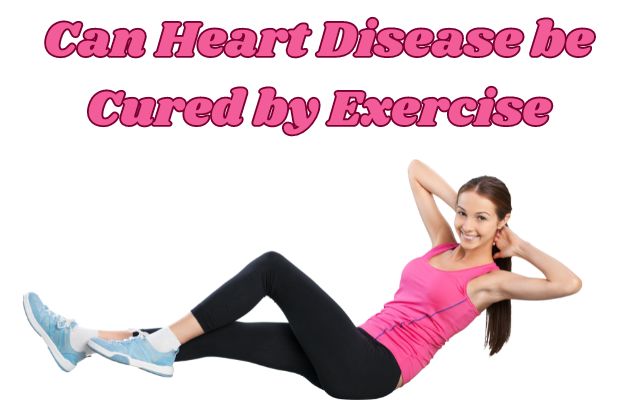Can Heart Disease be Cured by Exercise

Can heart disease be cured by exercise? One of the best things you can do for yourself is to exercise regularly, especially aerobically. It lowers your risk of developing heart disease. It benefits your mood, energy level, weight, blood pressure, cholesterol, and cholesterol levels.
Consult your doctor before beginning any exercise if you are not currently active. They’ll inform you of the safest things you can do. Inquire about exercises like sit-ups and push-ups. In these, muscles are strained against one another or a heavy object. You may have to stay away from them.
Make sure that tasks like raking, shovelling, mowing, and cleaning are not off-limits, as well as carrying and pushing large objects. Some people get exhausted from household chores. Achieve only what you are able to do without becoming exhausted.
Ask your doctor if you need to change any prescription medications before you begin exercising if you take any.
How Often And How Long Should I Exercise?
If you’re not already active, gradually increase your aerobic activity to include at least three or four 20 to 30 minute sessions each week.
Any quantity of exercise is beneficial for you, albeit the more the better.
What Type Of Exercise Should I Do?
Anything that makes you breathe more quickly counts.
Consider what you require. Consider walking and swimming, for example, if you’re searching for an activity that’s gentle on your joints.
Don’t forget to consider what would be enjoyable as well. Maybe you could do something you’ve always wanted to try or do something you used to do.
What works for you is also crucial. Do you require a workout at home? If you joined a gym, would you go there? Consider signing up for a dance class, hiking club, or recreational sports team. If you like it, you’re more inclined to stick with it.
Here are some pointers to help you include exercise into your daily routine:
- Stay within your budget
- Ban boredom
- Socialize
- Make playlists
- Commit
Stay Within Your Budget
Avoid investing in costly equipment or fitness club subscriptions unless you are certain that you will utilise them.
Ban Boredom
Choose a range of enjoyable activities. Avoid repeating the same action.
Socialize
If a friend is working out with you, it is more enjoyable.
Make Playlists
Make use of music to pass the time.
Commit
You won’t always feel like it, and you’ll come up with all kinds of reasons why you shouldn’t. You’ll need to decide in advance to suppress that need and continue with your activity.
Can Heart Disease Be Cured By Exercise?
Yes, you can stay healthy in many ways to keep your routine with exercise. exercise can be cure your health or various disease related to health or heart.
What To Do In Every Workout
There should be a warm-up, a conditioning period, and a cool-down following each exercise session.
- Cool down
- Warm up
- Conditioning
Cool Down
You’re getting ready to stop working out. After working out, avoid sitting, standing motionless, or lying down since you can feel faint, dizzy, or experience heart palpitations (fluttering in your chest). Reduce your activity’s intensity for the optimal cool-down.
Warm Up
As your body adjusts to what you’re asking it to do, take it easy for a while.
Conditioning
This is the bulk of your exercise.
Workout Tips
- Resume slowly after a break
- Don’t exercise outdoors when it’s too cold, hot, or humid
- Pace yourself
- Stay hydrated
- Skip extremely hot and cold showers or sauna baths after exercise
Resume Slowly After A Break
If your normal exercise routine is interrupted for a few days (for example, due to illness, travel, or inclement weather), ease back into it. Start with brief, less strenuous activity, then gradually increase until you reach your previous level.
Don’t Exercise Outdoors When It’s Too Cold, Hot, Or Humid
You could become fatigued more rapidly in high humidity. Extreme heat can impair circulation, make breathing challenging, and bring on chest pain. Mall walking and other indoor activities are better options.
Pace Yourself
Don’t act quickly or excessively. Between workouts, give your body a chance to recover.
Stay Hydrated
Even before you feel thirsty, especially on hot days, drink some water.
Skip Extremely Hot And Cold Showers Or Sauna Baths After Exercise
Your heart has to work harder due to these soaring temperatures.
How Hard Should I Work?
If you can talk but cannot sing, your cardio workout is moderate. If you can’t say more than a few words without taking a breath, you’re working out hard.
If you think you should lower your exercise intensity, ask your doctor. It is far better to begin slowly and build up to more difficult routines. That will aid in avoiding harm.
What To Look Out For
If you have a fever or are not feeling well, avoid exercising. If you have heart issues, you should hold off on returning to your normal routine until all symptoms have subsided, unless your doctor instructs you otherwise.
If you get a rapid or irregular heartbeat or heart palpitations, stop what you’re doing. After 15 minutes of rest, take your pulse. Call the doctor if the heart rate is still greater than 100 beats per minute.
Another clue to quit is when you are too exhausted or out of breath. Inform your physician of what occurred or make an appointment.
Does it hurt when you work out? Don’t disregard it. When you get discomfort anywhere in your body, stop. Your joints could get hurt.
In the event that you:
- Feel weak
- Are dizzy or lightheaded
- Have unexplained weight gain or swelling — call the doctor right away
- Feel pressure or pain in your chest, neck, arm, jaw, or shoulder
- Are concerned for any reason
- 10 Tips for Exercise in Summer Season
- Exercise in Asthma: Good or Bad?- Complete View
- Benefits Of Exercise : 10 Key Benefits Of New Exercise Bike
Conclusion
It’s crucial to exercise frequently if you have heart problems. Exercise can help you control your blood pressure and cholesterol levels and strengthen your heart muscle.
People May Ask
Q- Can you reverse heart disease with exercise?
A- According to a study, those who exercise into late middle age can reverse or lower the risk of heart failure brought on by years of inactivity. However, there is a catch: According to studies, it requires four to five days a week of aerobic exercise for two years.
Q- Can you completely recover from heart disease?
A- It can take a few weeks or months to recover if your heart attack was quite minor. However, it could take up to a year to fully recover if you have open-heart surgery or a bypass due to difficulties.
Q- Can heart blockage be cured by exercise?
A- White males who exercise for more than 7 hours per week are most at risk of developing coronary artery calcification, according to a lengthy study with more than 3,000 participants.
Q- Can a person with heart disease exercise?
A- People with heart disease should exercise on most days, totaling at least 150 minutes of moderate intensity exercise each week, just like healthy adults of all ages. Increasing your heart rate and respiratory rate while maintaining conversational ability is what is meant by moderate intensity.
Q- How do I know if my heart is OK?
A- Blood tests, cardiac CT scans, cardiac MRIs, cardiac catheterizations, coronary angiography, echocardiography, stress tests, electrocardiograms, and other diagnostic procedures could be used.



